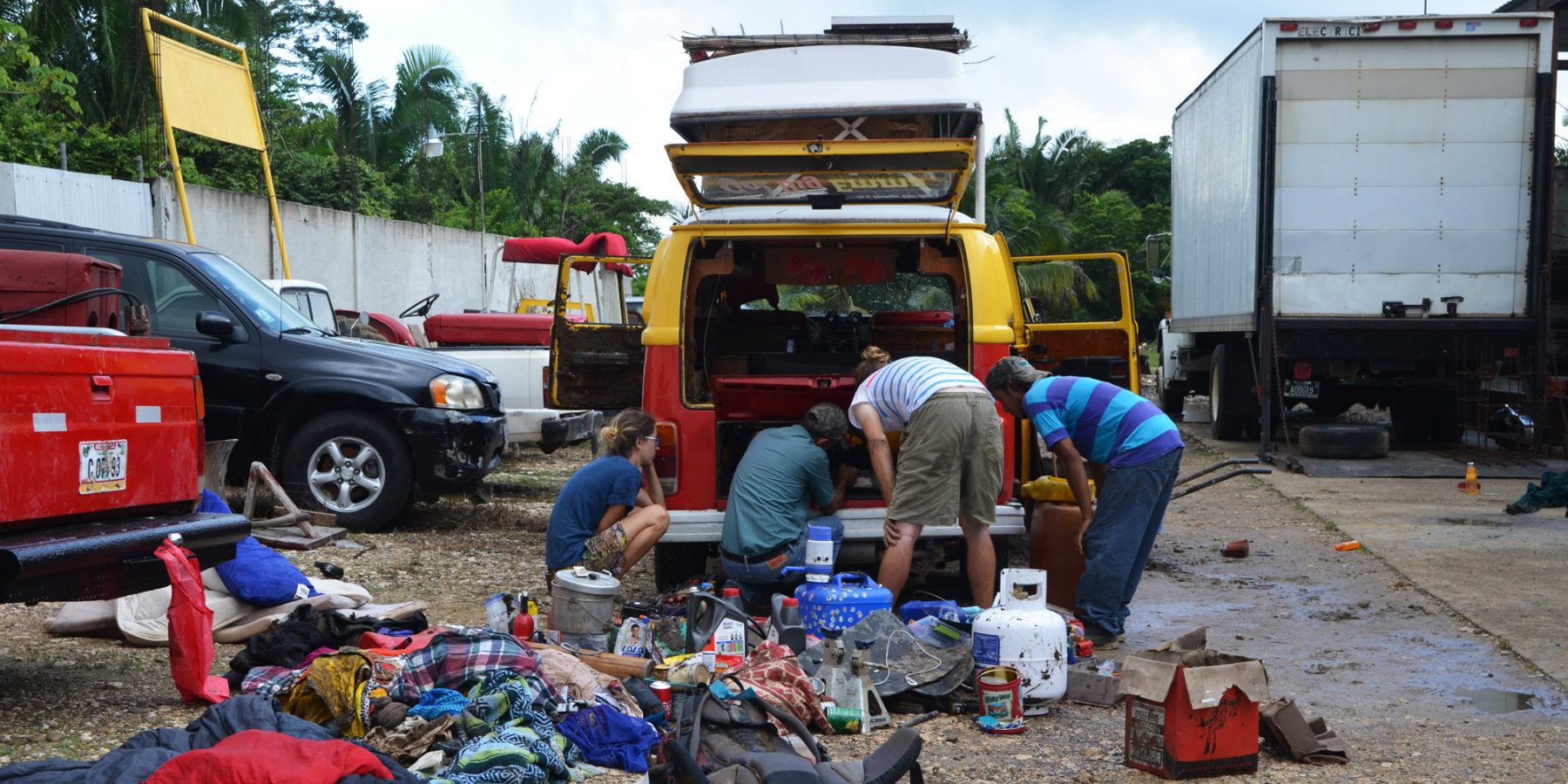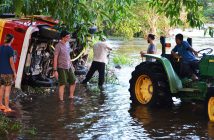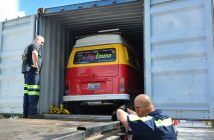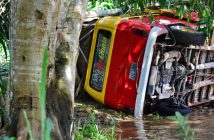We had rescued Big Emma from her watery grave in the Sibun River, but now the real work began. Could we save our possessions and our beloved Bus, or had we merely recovered a corpse?
This post is part three of a four-piece series. Check out the other parts here: Part 1: Blindsided, Part 2: Recovery, and Part 4: Rest.
Sploosh! A fountain of dirty river water came splashing out of the spark plug hole as I turned the engine with a heavy steel wrench. With the help of the lever, the motor moved easily enough, but it stuck every time a piston had to push up gunky water inside a cylinder tube, bare metal against metal, with no oil to smooth its motion.
I cranked the engine backwards until it got stuck again. Then forwards again with full force, pulling on the lever as hard as I could to gain momentum. Sploosh, the piston moved and pushed more water out of the hole. For at least half an hour I had been doing this, kneeling in the mud behind the engine hatch, pulling and pushing on the wrench to squeeze the water out of Big Emma’s iron heart. Every few turns, the wrench slipped off the alternator nut and my hand slammed into the engine case, leaving bruises on my knuckles.
Big Emma was sitting in a muddy mechanic’s yard. The tropical rain was falling hard, drumming on her fiberglass roof and growing the puddles in the yard into a system of miniature lakes and rivers. Car wrecks in varying states of decay lined the concrete wall to the left. On the right, the large mechanic shop was housed under a metal roof, towering at least seven meters high on massive steel beams. Under it, more vehicles were propped up on stands. An engine was missing here, a wheel had been removed there. Men were working on the cars, a few others were sitting around a table in the center of the shop, drinking coffee.
Since the night Carlos had towed Big Emma here, this yard had been our workplace. Every day, we would walk here and work on the Bus. Each day we would get drenched in the rain, then bathed again in sunshine. Each day, we would save some of our belongings, while others would turn out to be beyond help.
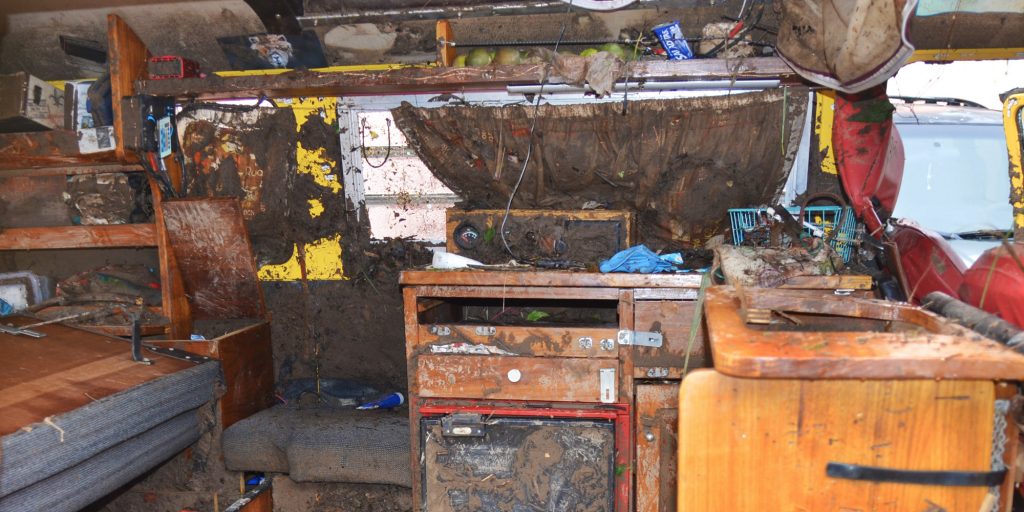
The inside of Big Emma before we began to clean her
True friendship smells like gasoline
One day turned into the next, and then another and another still. Nightly sleep breaks interrupted our work, but they provided neither relaxation nor distraction. Each morning I woke up, my head filled with fading dreams of bolts and wrenches. Each morning, we drank instant coffee out of a wobbly plastic cup in our hotel lobby, sweetening it with sugar we shared with a colony of little black ants that were carrying it away from the box, grain by grain.
The walk to Carlos’ shop: down the bike path, past the roundabout and the Asian supermarket, and into the yard. In the evening, we would come back to the hotel, wash the dirt off our skin, eat fried chicken from a nearby restaurant, and fall into bed exhausted. The next morning, the same routine would start over.
Caro and Konsti were still with us, sharing our misfortune and our hotel room. I am sure they had imagined their vacation differently. Adventurous maybe, but in a less literal way. More tropical paradise instead of the stinking mud they got. Instead of diving the second-largest coral reef in the world, Caro would spend hours bent over the washtub, scrubbing stains out of our shirts and bedsheets.
Konsti would lay in the dirt under the car with me, getting sprayed with gasoline while I disconnected a fuel line. Friendship doesn’t show itself in good times and laughter. True friendship has the stench of gasoline and rain soaking you to the bone. It’s choosing hardship over holidays, hard labor over sunbathing on the beach.
Mike and Geneva, our vanlife friends who had been a pillar of stability on the day of the flood, had moved on to Guatemala. Their Belize visas were running out and there was nothing more they could have done to help us. We gave them a goodbye hug and promised to see each other again somewhere, someday. This was the way of travelers. On the road, you make friends, live through adventures together, and then part ways, only to start the cycle again.
Into the wheelbarrow
Every day from morning to nightfall we worked to revive Big Emma. We scraped layer after layer of brown mud from her. The doors, her walls, the dashboard. We cupped handfuls of stinking dirt out of the engine compartment. We threw belonging after belonging out the sliding door. Clothes and bedsheets were tossed into a giant pile headed for the wash barrel. Things we thought worth keeping flew into another heap, stuff beyond saving was pitched into a wheelbarrow, ready to be carried off to the garbage pit behind the shop.
Every once a while, one of the mechanics would go through our designated garbage and would say Don’t throw this away, we can fix that!
Go ahead and take it, we would say.
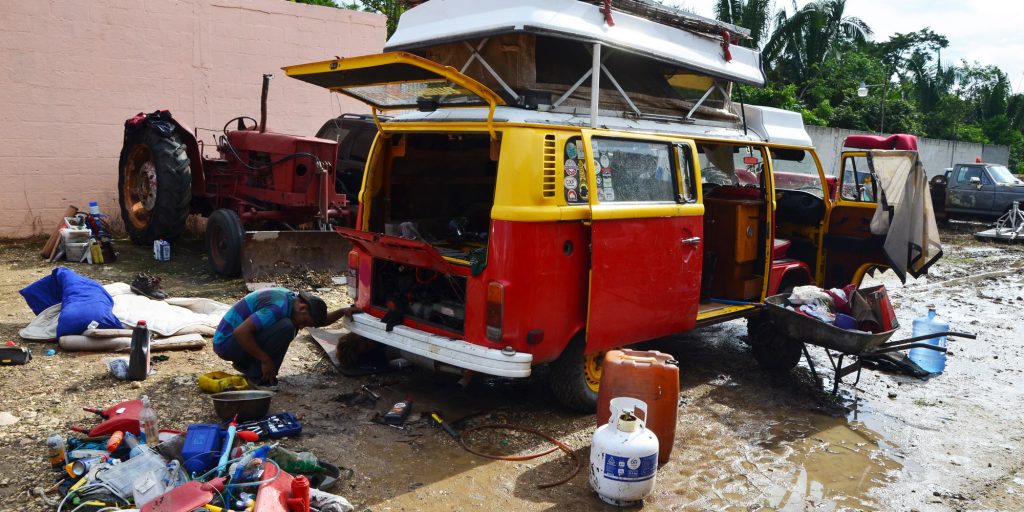
Out into the mud, out into the wheelbarrow, out with it!
Our flashlights, our walkie-talkies, even our drone we gave away. The chemicals in the battery packs had been boiled in their shells by a short circuit. The electronics were fried. With lots of work, maybe it was fixable. For us, it would be easier to one day buy a drone again if we really wanted one. A Belizean mechanic would have to work much longer to be able to afford one. If he could fix it, good for him.
Our books were garbage, too. The water had swollen them up and the pages had turned into one solid mass. Our bookcase was filled with a homogeneous block of dissolved fibers and running ink, words and phrases from Game of Thrones bleeding into On the Road, Jon Snow hitchhiking across the American post-war Midwest. I had to cut the block out of the bookcase with a knife to get it out. The only place for our forlorn library to go was straight into the wheelbarrow.
Open heart surgery
And then there was the engine. Big Emma’s metal innards had taken a hard beating. Water had filled up the engine itself, as well as the fuel tank and lines. Draining the oil had gotten the better part of the water out, but there was still much to be done. We needed to turn the engine over, so the valves would open and allow the water in the cylinders to flow out. All fuel lines needed to be flushed out and cleaned of mud. The battery had been connected while the water rose, so we feared for all of the electrical components: starter, fuel pump, the computer box, our newly rebuilt alternator.
We took everything out we could, piece by piece. Carlos disassembled the starter on his workbench and blew compressed air over it. Drops of water and pieces of dirt came flying out of the copper windings. A few more days, and it would have started rusting. After every piece was clean, he reassembled the starter. Now, let’s see if it works, he said, lumping an auto battery onto the workbench. A starter cable to the negative pole of starter and battery, the other to the positive one.
Upon touching the cable to the starter, sparks came flying. And with it, a whizzing sound. It worked! The electric motor in the starter was spinning like nothing ever happened. We threw our hands in the air, yelling, Carlos smiled and hooted like a little kid who just put the last brick onto his Lego spaceship. On to the fuel pump. The same procedure, and the same result. Success! Alternator – the same thing!
Wow, I thought. Back in the day, Bosch and Volkswagen built some sturdy car parts. If 40 years of use and a river couldn’t drain the life out of them, what could? Even the battery, which I had thought was undoubtedly beyond saving, still held a charge. We had always described Big Emma as strong and stubborn in the Big Emma Diaries, but in the end those had been merely stories. An imaginary character we projected onto an object.
Or was it? She might not have a personality, but fierceness was nonetheless one of her signature traits. That was clearer to me than ever.
The engine computer. We could only clean it and hope for the best, there was no way to test it. We would only know if it worked when the car would or wouldn’t run. Until then, we had to wait. In the meantime, we had to expose every piece of Big Emma to as much air and heat as possible, so the water could evaporate before it would begin to oxidize the metal. Piece by piece, we installed the cleaned parts back into the car. I felt like a surgeon connecting the cables and hoses and pipes. I was performing an emergency operation, and my patient’s life depended on it. Her future. And not only hers, mine as well. What would we do if something was broken we couldn’t replace? Carlos was handy with fixing cars, but he was not a magician. If the computer was toast, what would we do? We sure wouldn’t be driving out of here in that case.
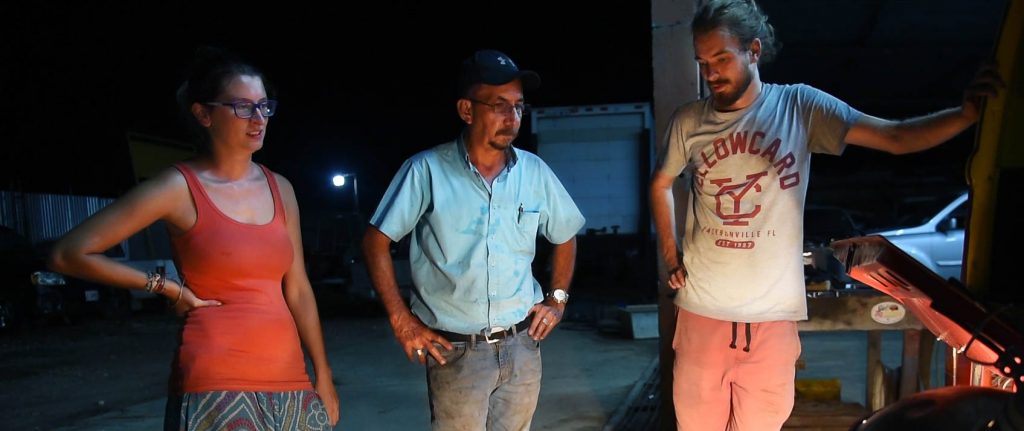
Carlos, our savior, pondering Big Emma’s engine with us one night
Tests of ingenuity
On day three or thirty or however many days had passed by then, we had cleaned and installed every last part back into the engine compartment. Carlos looked at me. Llegó el momento de la verdad, he said. Here it is, the moment of truth. I walked to the front on weary feet. The driver’s seat had been taken out to be cleaned with a power washer. I sat down on the bare metal and put the key into the ignition. It turned hard — dirt must have gotten into the lock and switch as well.
One click and the dashboard lights went on. That was promising. I yanked the key to the right and the starter came to life. The engine turned over behind me. Slowly at first, then faster and faster. It sounded almost like a steam engine back there, the starter whizzing and the engine pumping. Whoot toot-tut-too. Whoot toot-tut-too. Over and over again, every time a little bit faster. Come on! I thought. Ignite already! Big Emma pumped and whooted, but no spark came and there was no ignition. What was wrong? We had cleaned everything, put everything back. We had tested all the components alone, why wouldn’t they work when linked together now?
Maybe we’re not getting spark, I suggested when I walked to the rear of the car, where Carlos had already buried his head in the engine compartment again. Konsti stood beside him, looking as clueless as I felt.
No, no, we have spark, he said. It’s not the fucking spark! But no gas. Smell it! Do you smell gas? He looked at me.
No, I answered.
Because there’s no gas! he said. No fucking gas!
Carlos swore a lot, no matter if he was speaking English or Spanish. No matter if he was happy or upset, swearwords were an integral part of his vocabulary. He was a slender man in his 50s, with a thin, bony face and a scruffy mustache. A cigarette was constantly dangling from the corner of his mouth. My uncle is a strange man, his nephew Thomas would say. He could be bubbly and excited about something in one second, and grumpy and solemn in the next. One moment he would tell us how much Emma reminded him of his daughter, his eyes shining; a minute later he would run nervously up and down his shop and bark one-word commands at his employees.
His nephew was the opposite. A tall, handsome Mexican, Thomas had a soft voice and strong arms. He was a photographer and only helping out in his uncle’s shop whenever he wasn’t on assignment somewhere in Belize or Mexico, shooting everything from weddings to major magazine stories.
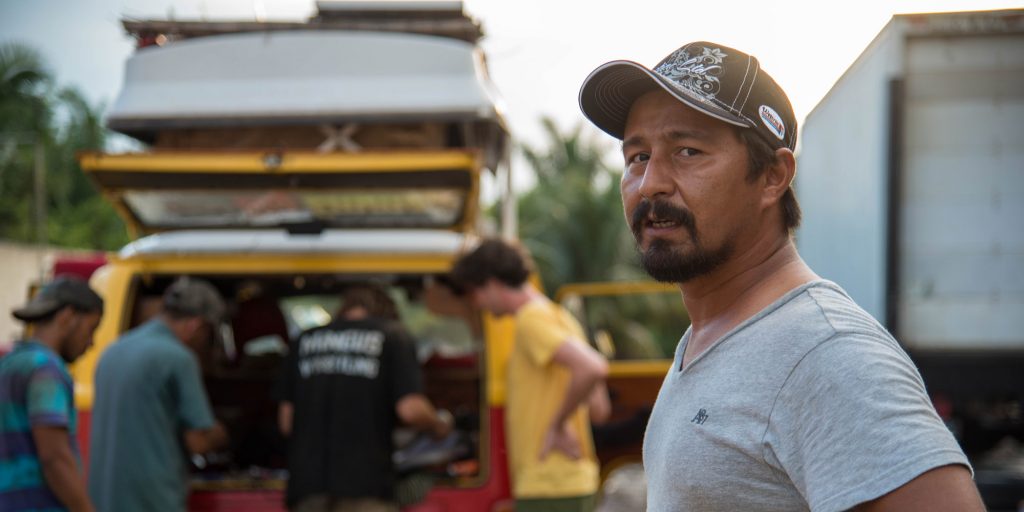
The exhaustion is plain on Thomas’ face after several days of helping Big Emma.
Now Carlos commanded Thomas to turn the key and attempt to start the engine again.
You go under the car and listen for the fuel pump, he told Konsti. When Carlos had an idea, everybody in reach had to help him see if it worked. Thomas turned the key and the engine started turning. Only Konsti’s legs were sticking out from under the Bus as he laid to listen for the whizzing of the fuel pump. It’s working! he yelled back to Carlos.
It continued like this. Carlos would have a theory and Thomas, Konsti, me, and sometimes Emma or other employees in the shop had to test it. We took out the fuel injectors and watched them spray gasoline into the engine compartment while Carlos’ cigarette dangled from his mouth, glowing softly. Nah, I won’t ignite. I’ve done that a million times, he said.
We tested resistors, wires, sensors. And finally a relay. It was making its characteristic clicking sound, so we never suspected it. It turned out that although the contacts were moving, they were never touching. Without contact, the fuel pump would run for a short while, but it would stop again before the engine could start.
Carlos took a small piece of wire and superglued it between the contacts so they would close. No problem, he said. At home you replace, but this will work for a while. I was so used to the constant availability of replacement parts, I had never even considered a relay repairable. But in Belize, nothing was thrown away without at least attempting to repair it, no matter if it was a relay or a drone.
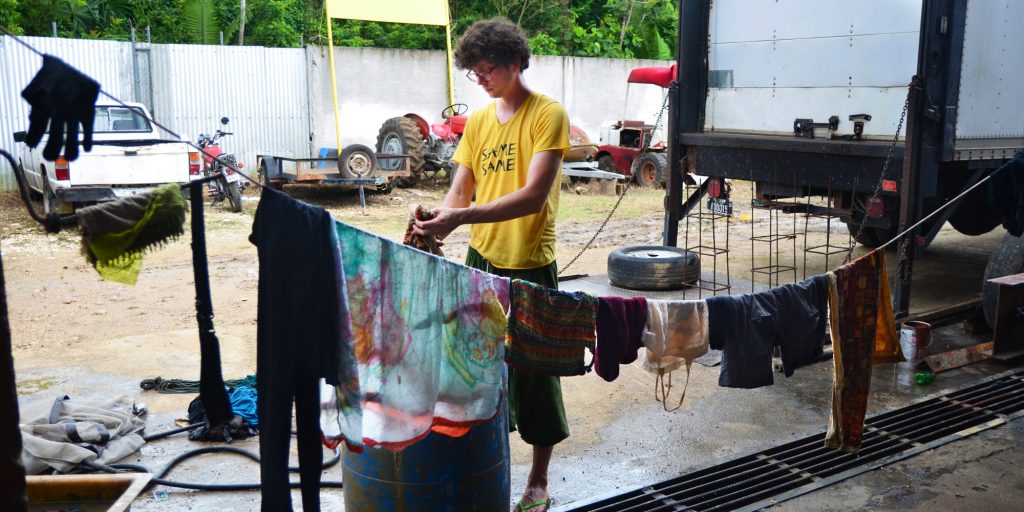
Konsti washing our clothes and hanging them all over the mechanic’s shop.
I was nervous when I went back to the driver’s seat to give the glued relay a try. What if it’s not any of those parts? What if it’s something deep down in the engine? I couldn’t say what, but something down where we couldn’t reach it, something that the river had rusted. Who knew? What if all our efforts were for nothing?
Here I Am
I got into the car where the driver’s seat used to be and turned the key in the ignition. Dash lights on. Step one. Here we go. The starter whizzed and the engine turned and whooted. Would there be gas this time? Pop, there it was, an ignition. Yes! Come on! Pop. Pop. Pop-pop-pop. With every blow the engine gained momentum and then, finally, there she was, exploding into action, spitting black smoke as she coughed the remaining water out of her lungs. It sounded painful and desperate, but it was the sound of a running engine! I floored the gas pedal and she screamed, an angry scream for life, cursing the odds and crushing all doubts. The fire burned away the last grains of dirt, a cleansing of the burdens of the past.
Here I am! Big Emma roared. No river, no flood can ever bring me down, not me, not this Bus that has seen so much! Here I am, and don’t you ever forget it!
Everybody in the shop dropped whatever they were working on and came over to watch and congratulate. Laughter and cheering filled the air together with dense smoke out of Big Emma’s exhaust. Carlos lit another cigarette, smiling. Thank you, I told him. We would never have managed it without you, I added in thought.
After escaping the flood, out on the highway in the rain at night, I had been happy to be alive. But it was only now that I felt like we had truly made it. We had not only saved ourselves but our companion as well. A limp, dead body when we pulled her out of the river, we had performed CPR and she had come back, coughing and puffing black smoke. But she was there, and alive.
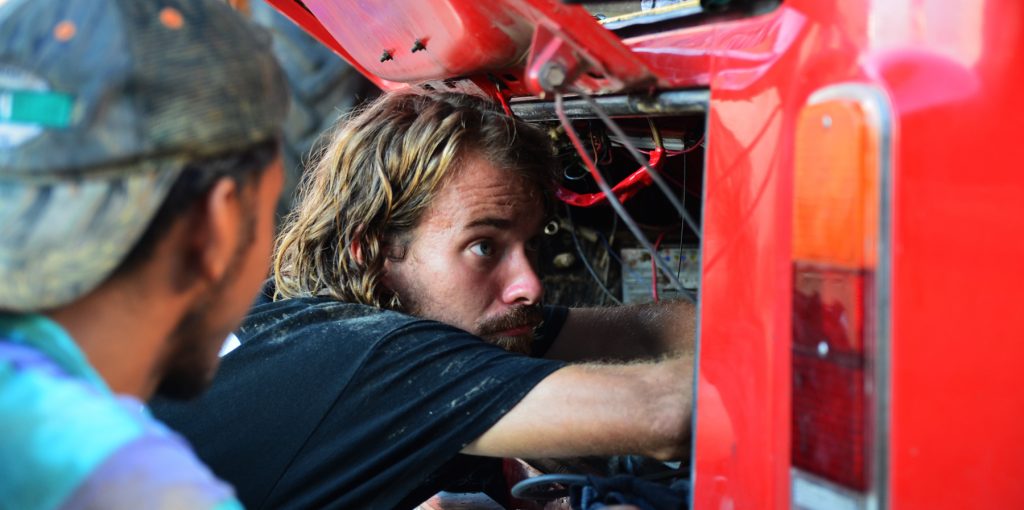
Elbow-deep in Big Emma’s engine
We hadn’t even realized it, but we had been desperate in these past days. Our dream had taken a serious hit and it had come tumbling down, shattered into what we feared were irreparable pieces. But now, thanks to the amazing help from Carlos, his nephew Thomas, Caro, Konsti, Mike and Geneva, Emma’s dad, and Carlos’ employees, we had ignited hope.
We had cleaned and sweated and scrubbed and cried out in anger. We had cursed the river and the universe and ourselves, but now the roar of Big Emma’s engine made all this tension fall away. While before all our work had felt like licking our wounds in defeat, now it felt purposeful. We’re not just cleaning up the garbage after the party, we’re setting the stage for something new.
But we were still in Central America with a Bus we couldn’t live in. Our Belizean visas (and Big Emma’s as well) were running out and we had no car that we could drive farther than a few miles. This wouldn’t be easy. But at least the gang was together again.
This post is part three of a four-piece series. Check out the other parts here: Part 1: Blindsided, Part 2: Recovery, and Part 4: Rest.

